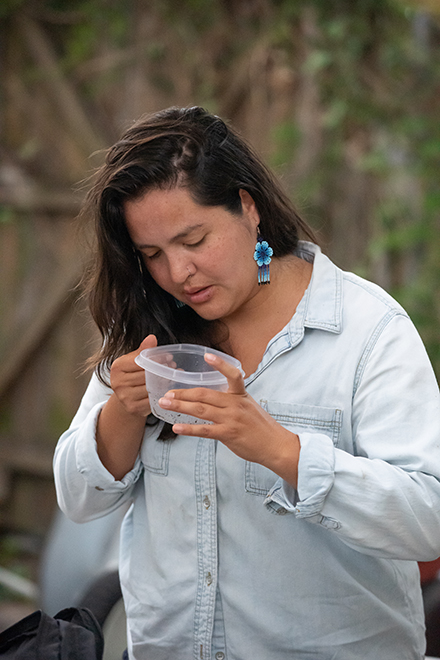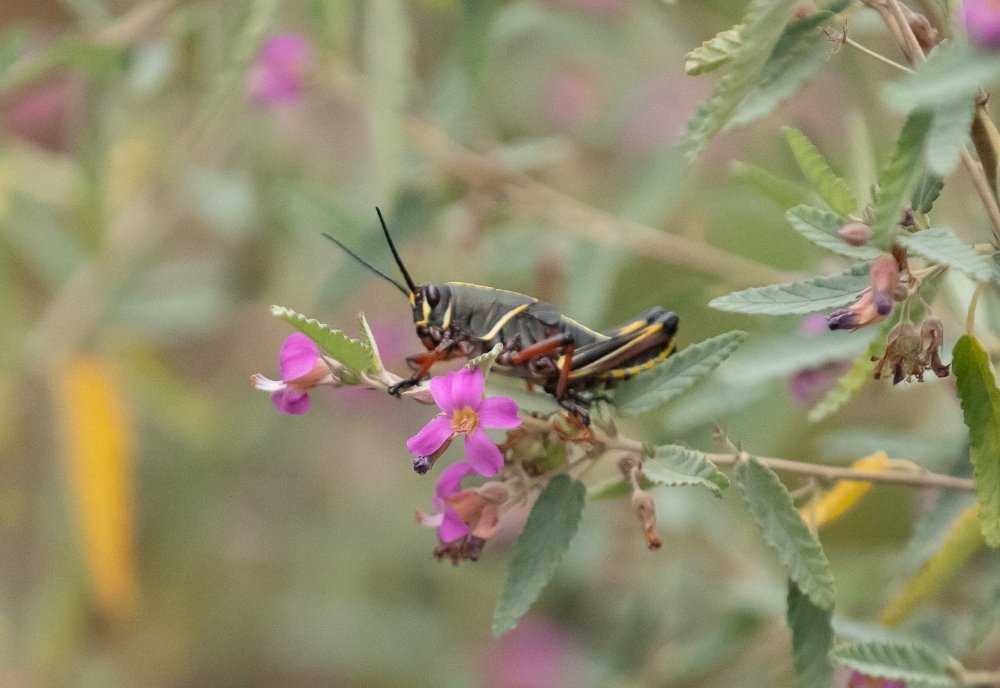Dr. Estelí Jiménez-Soto, a new assistant professor in the School of Geosciences, is leading a study on insects in urban environments through the USF Agroecology Lab. Serving as the principal investigator for this study, she and her team aim to understand the diverse and abundant organisms and their ecological significance as we move towards an urban dominated future.

Dr. Jiménez-Soto examining a bug trap at the Ybor St. Community Garden. (Photo by Corey Lepak)
Jiménez-Soto is from Chiapas, Mexico, the country’s southern-most state, where she was born and raised. Her upbringing in this region, rich in both ecological and cultural diversity, greatly shaped her research interests, specifically in areas of biodiversity, agriculture, political ecology, climate change, and migration.
Agroecology represents an integrated approach between the relationships of plants, animals, humans, and their environment within agricultural practices. Jiménez-Soto established the agroecology lab, with a focus on investigating the significance of biodiversity in agroecosystems and examining how social and ecological communities adapt to changes in agriculture practices and the climate.
The agroecology lab primarily examines plantations and coffee agroforestry in southern Mexico, but also has projects in Tampa Bay. This latest research project aims to understand how agricultural practices in urban farms and community gardens impacts insect diversity and the benefit that these insects provide for agriculture.
Jiménez-Soto and the lab are focused on learning:
- How habitat characteristics shape the diversity and composition of beneficial insects, such as natural enemies of important pests and pollinators
- How insects and their network of interactions are shaped by rapid changes in weather conditions
- How urban farms and community gardens support food sovereignty, and community resilience in the wake of climate change, urbanization, and food insecurity
“Locally, we are partnering with the Coalition of Community Gardens of Tampa Bay, which is a network of gardeners who are interested in supporting gardeners and co-creating knowledge to grow food in the city, while strengthening neighborhoods in urban Tampa,” Jiménez-Soto explained.
The project has received support from a $449,000 grant through the New Innovator Award from the Foundation for Food and Agriculture Research. These funds support graduate and undergraduate students who are involved in this research. Jiménez-Soto is joined by USF students Christian Fenimore, Naomi Gutterman, Jocelyn Meyers, Dharsh Saravana, Hannah Toppel, and lab manager Ruby Haswell.
As cities are projected to host over 70 percent of the population by 2050, these areas face potential challenges related to food accessibility and security. Jiménez-Soto’s interest in studying urban agriculture stems from their significance as hubs for biodiversity preservation and community development.
“Community gardens and urban farms can fulfill critical needs for biodiversity conservation, particularly insects, but also birds, bats, and other important organisms, while also strengthening the social fabric in the wake of urbanization. The social and environmental benefits of community gardens are well documented in temperate and Mediterranean climates, but tropical and subtropical climates present additional challenges. One challenge being increased incidence of pests and diseases, intensified hurricanes, and droughts. However, community gardens also provide benefits beyond food production. Green spaces in the city are associated with improved human health, including mental health benefits, social cohesion between individuals of diverse backgrounds, ages and ethnicities, knowledge sharing, and improved nutrition. Agroecology as a science, practice, and social movement highlight the importance of biodiversity, food sovereignty and the co-creation of knowledge as pillars for food system transformation,” Jiménez-Soto said.
Another factor driving Jiménez-Soto's interest in this topic is the widespread decline in insect populations, due to factors like deforestation, industrial agriculture, climate change, and invasive species. Understanding how to sustain and enhance insect diversity within urban farms is important for the agricultural landscape of the future.
“Insects are one of the most abundant and diverse organisms on our planet. This diversity above and below ground allows insects to be situated at the interconnection of many trophic links and thus maintain important ecosystem functions relevant to humans. This includes examples, such as the pollination of most crops, the biological control of pests, diseases, and weeds, and improving soil qualities that relate to the stabilization of organic matter, which is important for plant nutrition and carbon sequestration. Relying on these services provided by biodiversity, instead of using fossil-fuel derived agricultural inputs, such as pesticides, herbicides, fertilizers, contributes to the sustainability of agricultural systems,” Jiménez-Soto's explained.
To explore the relationship between biodiversity and urban agricultural ecosystems, Jiménez-Soto and her team gather methodologies from various disciplines, such as community ecology, anthropology, and political ecology. This multidisciplinary approach helps her team to understand food systems and the environmental dynamics that shape them.
“To study drivers of insect diversity, we are setting up six pitfall traps in 15 community gardens distributed across Hillsborough County. We leave traps open for three consecutive days during three collection events in the Spring season. We are also collecting local and landscape-scale habitat data in each of the gardens using field methods and Geographic Information Systems (GIS). Currently, we are finalizing our last collection, and we are excited to see what the data tells us about insect diversity and composition in community gardens,” Jiménez-Soto said.
Christian Fenimore, a recent graduate with a bachelor’s degree in environmental science & policy and a minor in biology, served as a student researcher on this project. While his contributions spanned various aspects of the project, his primary focus was assisting with the GIS component. As he looks forward to pursuing a master’s degree in environmental science or ecology, Fenimore credits this experience for providing him with a fresh perspective on agroecology.
“This project has enhanced my understanding of the connections between gardeners, farmers, and everyday citizens by contributing to this research. While I did not have a major role in communicating between our garden/farm sites and the people who own/manage them, getting to see that process done by a peer in the lab helped me understand how I, as a researcher, can improve my communication with local citizens. Working in Jimenez-Soto's laboratory was an absolute pleasure and I very much enjoyed getting to contribute towards this project. I am very excited to see where the project will go in the future and be able to look into the results when they are closer to being completed,” Fenimore said.
While the study is ongoing, Jiménez-Soto and her team have begun data collection and will analyze over the next few months. They have already observed a wide variety of arthropods in their insect traps, along with diverse vegetation.
“In the future, I hope to extend this study and continue examining how insect diversity impacts species interactions, such as predator-prey, herbivory, and insect-plant interactions, all of which are crucial in agriculture and for the community of gardeners and urban farmers. We are hoping that through this project we can increase awareness around the importance of insects and biodiversity, but also the benefits of community gardens in the city, beyond food production,” Jiménez-Soto’s said.
To learn more about Dr. Jiménez-Soto’s research, please visit the website for the USF Agroecology Lab.
